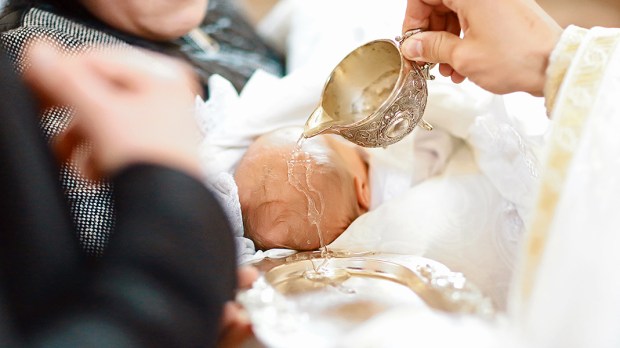Lenten Campaign 2025
This content is free of charge, as are all our articles.
Support us with a donation that is tax-deductible and enable us to continue to reach millions of readers.
Sunday’s feast of the Baptism of the Lord is a bridge each year between the magic of Christmas and the long trudge of Lent.
That’s what Baptism does: It gives us the grace of the “wonder and awe” of Christ’s life amid the hard slog of daily Christian life.
It’s important to remember that not only do we make promises at Baptism, but God “makes promises” too: The Church tells us what is expected of us, but also what we can expect from Baptism. What can we expect?
First, we were promised freedom.
When we renew our baptismal promises each year at Easter, the priest asks: “Do you reject sin, so as to live in the freedom of God’s children?”
We say “I do.” What happens next? The Church says we receive “the power to live and act under the prompting of the Holy Spirit through the gifts of the Holy Spirit.”
The freedom we are promised is real freedom. Often, we think of freedom as doing whatever we want. But anyone who has ever tried to diet and failed knows that we do what we want all too easily. What we really want is the freedom to do what we know we should.
That is why Baptism sets you free. In the Gospel, John promises “I am baptizing you with water, but one mightier than I is coming. … He will baptize you with the Holy Spirit and fire.”
That would be Jesus. By being baptized, he gives us the gifts of the Holy Spirit, which empower us for self control, which is the opposite of slavery and the very definition of freedom.
Second, we were promised real happiness.
The priest asks: “Do you reject the glamour of evil and refuse to be mastered by sin?”
We say “I do.” After that, says the Church, “all sins are forgiven … as well as all punishment for sin. In those who have been reborn nothing remains that would impede their entry into the Kingdom of God.”
In other words, we promise to reject the illusory happiness that sin promises. In turn, God promises to give us the real deal: The happiness that comes from fulfilling the purpose for which we were created.
As St. Paul puts it, that leaves us waiting out the illusions of this world for the greatness to come: “The grace of God has appeared, saving all and training us to reject godless ways and worldly desires and to live temperately, justly, and devoutly in this age, as we await the blessed hope.”
Third, he promises a new family.
The priests asks: “Do you reject Satan, father of sin and prince of darkness?” We answer: “I do.”
When we were baptized we left one family for another. We left the family of violence and sin that goes back to Adam and Eve and entered the family of God that also goes back to Adam and Eve.
When we leave the family of the “father of lies” for this new family, says the Church, “Baptism not only purifies from all sins, but also makes [us] ‘a new creature,’ an adopted son of God, who has become a ‘partaker of the divine nature.’”
In Isaiah’s prophecy of the baptized life, he describes what this new family of God looks like: “I have grasped you by the hand; I formed you, and set you as a covenant of the people, a light for the nations.”
Fourth, he promises faith, hope, and and love.
The priest says: “Do you believe in God, the Father almighty, creator of heaven and earth?”
We say, “I do.”
The Church says Baptism “enables [us] to believe in God, to hope in him, and to love him through the theological virtues.”
In today’s Gospel, the voice of the Father was there to affirm Jesus after his baptism, saying, “You are my beloved Son; with you I am well pleased.”
This is the consequence of Baptism for all of us, says the Church, giving us Christ’s relationship with the Father because …
Fifth, he promises a special relationship with Christ.
The priests asks: “Do you believe in Jesus Christ, his only Son, Our Lord, who was born of the Virgin Mary, was crucified, died and was buried, rose from the dead and is now seated at the right hand of the Father?”
We say “I do.”
After that, says the Church, “A baptized person belongs forever to Christ. He is marked with the indelible seal of Christ (character),” says the Catechism.
This “belonging to Christ” should be a huge relief for us. It certainly was for the first Christians.
St. Paul describes how it feels to be saved by Jesus Christ: “When the kindness and generous love of God our savior appeared, not because of any righteous deeds we had done but because of his mercy, He saved us through the bath of rebirth.”
Sixth, we are promised active membership in the Church.
The priest asks: “Do you believe in the Holy Spirit, the holy Catholic Church, the communion of saints, the forgiveness of sins, the resurrection of the body and life everlasting?” We say, “I do.”
The Church says that after that, we “are incorporated into the Church and made sharers in her mission.”
Baptism gives us full membership in an international organization dedicated to love, led and animated by the Blessed Trinity, by God himself. This is another fundamental element of “good news” from the Gospel.
No longer is there an “in” group of people who have access to God’s grace. Now everyone is invited. “In truth, I see that God shows no partiality. Rather, in every nation whoever fears him and acts uprightly is acceptable to him.”
This is the great gift of Baptism in our souls.

